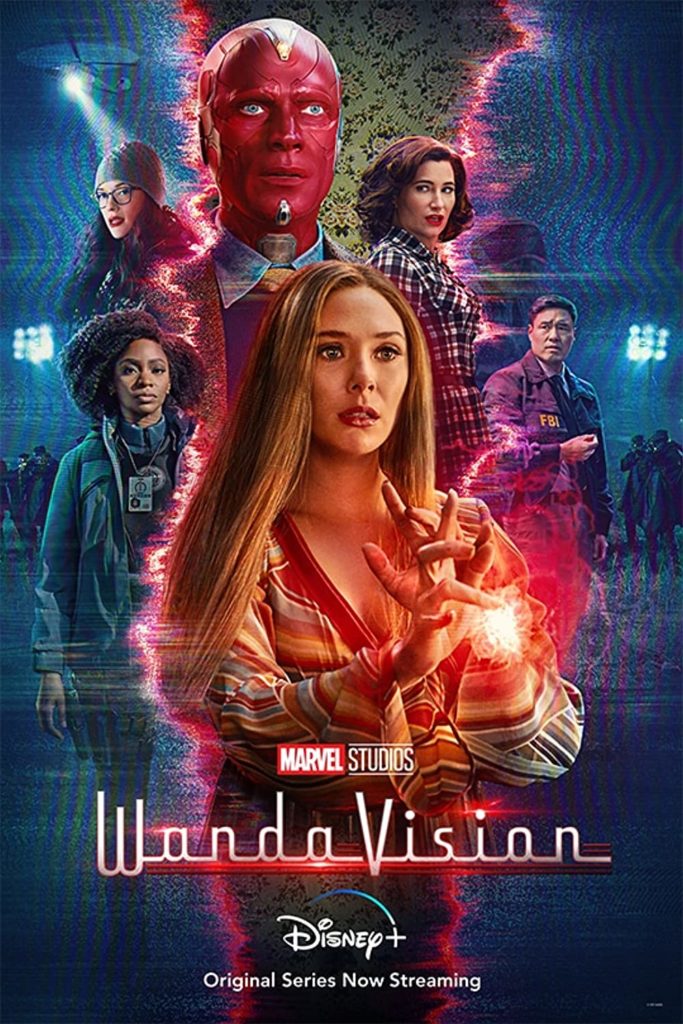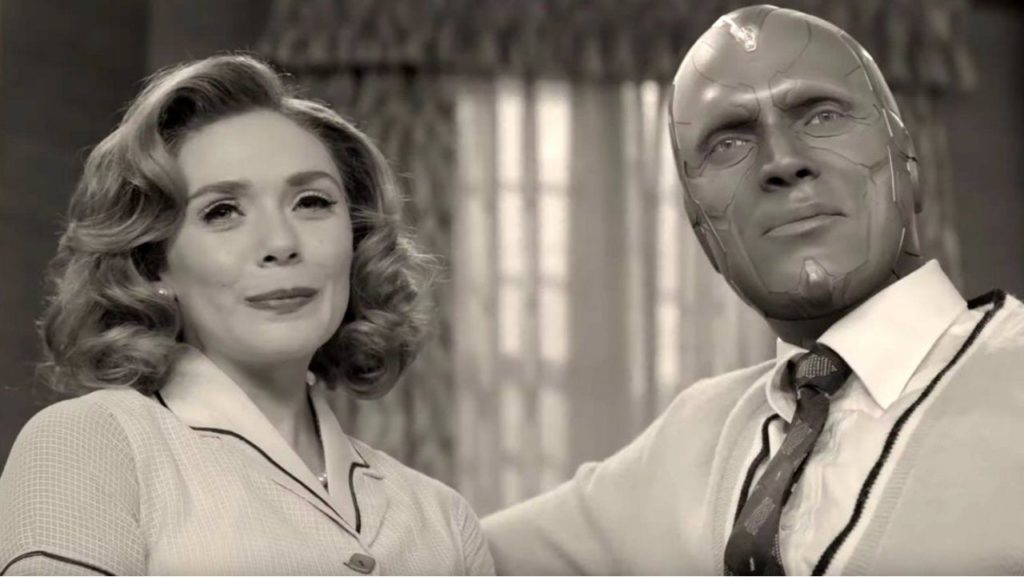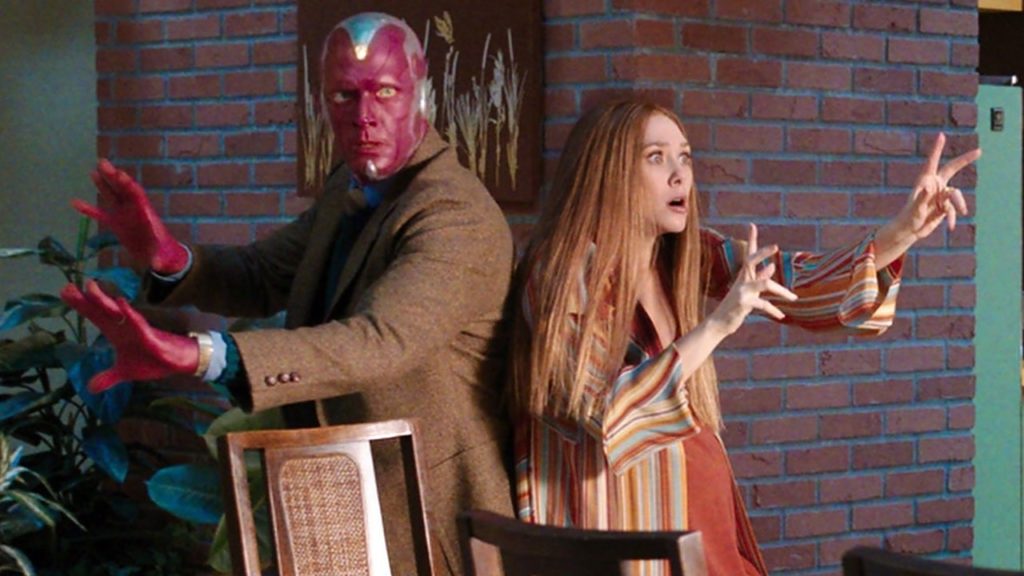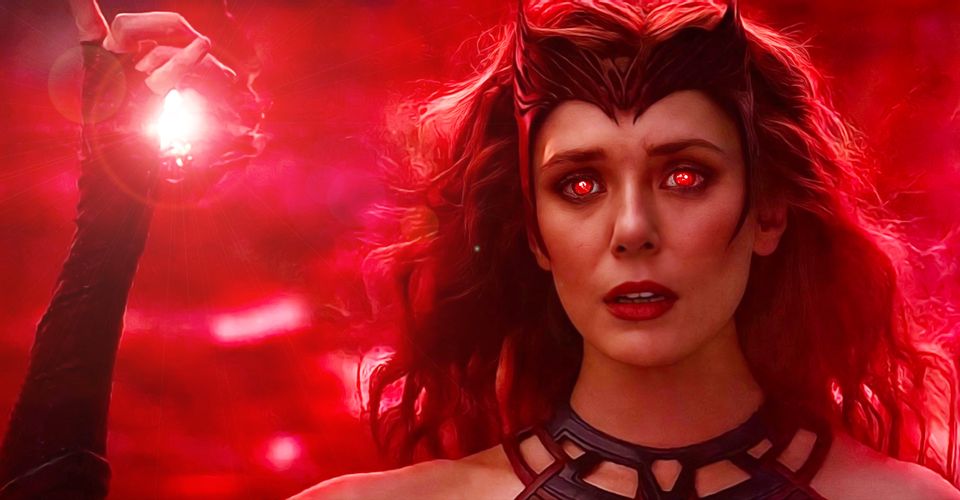How the soundtrack of WandaVision subverts expectations with genre-self-consciousness.
By Zach Ferguson

The long break between Marvel Cinematic Universe (MCU) movies due to the Coronavirus pandemic made audiences anxious to see more content. So why would one make a sitcom—a sitcom!—about somewhat secondary characters: Wanda Maximoff (Elizabeth Olsen) and her love interest Vision (Paul Bettany), who had died a few films back? WandaVision is a unique Marvel project. Fans were expecting the usual Marvel format: the intense action scenes, the villain’s tragic backstory, and the hero’s triumph marked by a lively full orchestra. When the first two episodes were released, the Marvel format was missing—for the first time in the MCU’S history. Wanda and Vision were a happily married couple living their double lives … in the suburb of Westview, New Jersey. Why New Jersey? How is Vision alive? Why is Wanda, a native Sokovian (derived from the Romani ethnic group), in this American sitcom reality? She even talks with an American accent. All of this is present within the first three episodes with basically no explanation to these oddities.
The pilot episode opens with a catchy intro theme called “A Newlywed Couple” which evokes the 1950’s sitcom format . The lyrics “A regular husband and wife” bring attention to the Janus-faced nature of the episode. Wanda clearly tries to make an effort to fit in with this suburb and the overall format of the show, which is very faithfully presented with black and white picture, classic television aspect ratio, and quirky xylophone cues. Wanda and Vision get involved in classic sitcom hijinx that is very unlike their characters, who are normally very serious.

The sitcom format is kept for the next two episodes. The theme songs change to fit the decade but each theme song also contains the same tritone called “the devil’s interval” as explained by the show’s composers Kristen Anderson-Lopez and Bobby Lopez. The repetitive nature of this tritone makes it very recognizable and initially does not disturb the upbeat nature of sitcoms. However, as the show progresses, there are very strange instances where characters break out of character. Wanda is caught off guard whenever this happens, but somehow, she seems to always put reality back into sitcom mode. She usually does this by literally rewinding the episode (I was not kidding when I said they take the sitcom format seriously).
These strange occurrences of breaking reality do fit with the devil’s interval in the music, as this ostensibly ordinary sitcom with its seemingly ordinary theme songs is actually hiding a dark, say, extraordinary, secret. This unexpected side also presents an interesting dynamic between the show’s story and audience expectation. Wanda thinks she is being ordinary by trying to fit this classic American television role marked by the happy , and easy-to-follow repetitive intro themes. But the audience cannot be as easily fooled. We know that this is anything but ordinary for the MCU. At the end of the third episode, it is revealed that Westview is actually trapped in this magical hexagonal dome, called the hex, that is forcing the citizens to play along in the sitcoms. The culprit of the creation of the hex is none other than Wanda, the Scarlet Witch.

After revealing this alternate reality, all scenes outside of Westview follow the Marvel format, while all scenes in Westview continue in sitcom style , although Wanda tries to keep these two worlds from colliding. In one such instance, she walks out of the hex, threatening people to stay out, speaking in her Sokovian accent. Back in the hex, she returns to the fake, ordinary, American accent. If viewers haven’t noticed, Agatha Harkenss (Kathryn Han), an opposing witch who talks to Wanda outside of the hex, notes—as if winking to the audience—“that accent really comes and goes.” Of course, part of the comedy in sitcoms is their self-awareness, sometimes breaking the fourth wall. Here this takes the form of genre-self-consciousness. A fake version of Wanda’s twin brother Pietro also makes a comment about her accent asking “what happened to yours?” when she questions him what happened to his accent. Wanda is the “creator” of her own sitcom. She writes her own script; and she is also the sound designer. The American sitcom aesthetic is intentionally shaped from Wanda’s subconscious. As a character, Wanda wants to hide her accent in order to feel like a normal person. But as a “director” of course, she cannot help but point to it. This manufactured sense of normality goes deeper than just having superhero powers.
Wanda’s Eastern European heritage is more than an accent:, her upbringing alludes to the Romani, a nomadic people at the margins of European countries, often being surrounded by poverty and war. As a child, she would watch old American sitcoms to improve her English. The “perfect” American reality presented in the sitcoms allowed young Wanda to escape from a life of conflict and violence. When Wanda is finally living in the United States, she is ostracized for being an outsider—marked in part by her accent. One could say it is because of her powers, but even Avengers are “Others” of sorts. This is why she is often antagonized outside of the hex. She is treated as a dangerous individual with evil intentions even though she tries to communicate that she just wants to have a normal life and have a normal burial service for Vision. Not only are people with accents literally misunderstood, but Eastern Europeans, especially, serve as villains in media—partly a hold-over from the Cold War. Wanda even makes a sly reply of “Maybe I already am,” to Monica Rambeau’s (Teyonah Parris) statement “Don’t let him make you the villain.” She cannot escape the pressures of the genre, sitcom or MCU.

Wanda’s heritage-caused tribulations that she has faced because of her heritage ties the knot in her decision to settle in the New Jersey suburbs and create her own sitcom-like world. Her predicament is a paradox :a stereotypical other in America, her safe haven is the suburban utopia of American sitcoms. Perhaps all Wanda really wants is to fit in with an idealized United States. If WandaVision is about Wanda’s grief of losing Vision due to her extraordinary status, one of the stages of grief is the denial of who she is and how she is perceived. To escape this grief Wanda will do anything in her powers to change her life, including its soundtrack—accents and music—even if it means denying her own heritage. The extraordinary world of superheroes is full of emotional and political woes that Wanda is tired of dealing with. The ordinary American sitcom reality, full of laugh tracks and quirky incidental themes, is devoid of this life shattering trauma—yet it may be just as illusionary. Wanda not only wants to be engulfed in this ordinary world, she wants to sound ordinary. One trying to necessarily “fit in” and cleanse themselves of their culture is reflective in Wanda’s denial as she alters the entire soundtrack of the Marvel format to assimilate herself. Wanda’s extraordinary assimilation reveals her insecurities and trauma break the Marvel format to represent her struggle with identity.